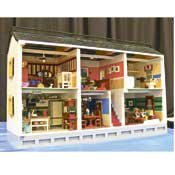The number of people living in multi-generational households has steadily increased over the last three decades, according to the Pew Research Center. As of 2008, 49 million Americans lived in households consisting of adult children living with their parents, grandchildren living with their grandparents or all three generations living under the same roof, up from 28 million in 1980. Reasons for such arrangements include financial difficulty, caring for an aging parent, cultural trends and adult children waiting longer to get married.
http://www.Grandparents.com's Dr. Georgia Witkin says older adults living with extended family lower their risk of depression because their contributions to the household make them feel needed. On the other hand, living in a multi-generational household can be stressful. Women who live in a multi-generational household increase their risk of heart disease because they often have to act as caregiver and parent, reported health experts in a 2009 British Medical Journal article. They are members of what caregiver.com calls the sandwich generation, caring for both children and parents.
Here are some ways to cope with a fulfilling (and complicated) living arrangement:
• Food: Contribute to the grocery bill regularly. Clearly label food that you wish to keep to yourself, and don't eat someone else's food if it is labeled.
• Finances: Divvy up the utilities, and be consistent when it comes to rent.
• Discipline: Unless the grandparents are their grandchildren's guardians, they should let the parents handle behavior issues until they are asked for advice. Parents should teach the children to respect and not take advantage of their grandparents.
• Caretaking: Discuss long-term care options and living wills with aging parents. Plan how to share.
• Intimacy: Schedule time alone at home or another location, and make arrangements with other family members to ensure privacy.
• Transportation: If you share a vehicle, be willing to share fuel and maintenance costs. Have a candid talk with an aging parent when it is time to give up the keys.
• Chores: Make a chart showing who does what and when. Even the younger ones can do something as simple as cleaning the bathroom sink.
Recommended Reading
"When the Time Comes: Families With Aging Parents Share Their Struggles and Solutions" by Paula Span. Springboard Press, 2009. $23.99.
"Boomerang Nation: How to Survive Living with Your Parents ... the Second Time Around" by Elina Furman. Fireside, 2005, $16.95.
"Grandparents as Parents: A Survival Guide for Raising a Second Family" by Sylvie de Toledo and Deborah Edler Brown. The Guilford Press, 1995, $17.95.
"Complex Ethnic Households in America" by Laurel Schwede, Rae Lesser Blumberg and Anna Y. Chan. Rowman and Littlefield Publishers, 2006, $34.95.


